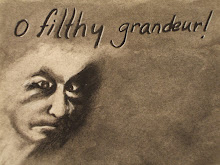Note: Though I do not give a full summary of the novel, please be aware that some of the analysis inevitably leads to spoilers. Also, I've broken up the essay so it's easier on the eyes. Feel free to comment--however if you would like to refute any point I've made, please wait until the final posting. The artwork on the left is the best example of cover art I could find.
China Miéville’s Iron Council is a novel set in the fictional world of Bas-Lag, as were its predecessors Perdido Street Station and The Scar. Like Perdido Street Station, Iron Council is set in New Crobuzon—a thriving city on the continent filled with the all the usual characteristics of city-hood: industry, government, class dissension, political upheaval, errant media, growing concerns of war, and a dissatisfied working class.
Iron Council takes place at the peak of the political dissent at the edge of revolution, and Miéville immerses us in this seemingly sudden revolution until the middle of the novel, where we are then taken to the origins of this revolution. This middle story, labeled anamnesis, or flash-back, is young Judah’s journey, allowing the reader to see (in present tense) the creation of the Transcontinental Railroad Trust (TRT) and its subsequent destruction when the Iron Council is formed after the railroad workers revolt and steal the train from the TRT.
The novel does not have one hero, in the sense that there’s a bad thing happening and the Chosen One needs to stop the bad thing. There are several key characters that influence the events in the novel, and (true to Miéville form) the reader is presented with more than one possible goal—part of the realness of the novel, since there are different people with different motives, and there are certain events that are beyond people’s control. There’s also this pervading awareness of “history in the making,” in that the characters all know that their actions are important.
Iron Council’s various themes present certain ideas about gender and sexuality in the novel, playing into a larger reality of a false world. There’s this pervading duality within the novel, pertaining to identity in its various forms; identity as it relates to abstract ideas, objects and people.
Part I: Gender and Sexuality
Iron Council presents us with an array of characters, and thus provides some perspective on sexuality and gender. As in reality, sexuality is on an individualized spectrum.
Cutter, who is in love (?) with Judah, or at the very least desires him more than just physically, seems to identify as homosexual—only being attracted to and having sexual encounters with men. Quite often Cutter reflects on this sexuality with an almost contemptuous pride:
He would not go into bawdy houses, would not rent some man’s arse. Not anymore. He only rarely visited warrens by the docks where those sailors who did not just make do at sea, but preferred it that way, would tout for men.
Instead he might perhaps once in a rare while push past crowds into certain inns with half-hidden entrances, thin rooms, thin bars and lots of smoke, older men watching each newcomer eagerly, men in groups laughing raucous as hell and others sitting alone and not looking up, and what women were there were men, dollyboys, or were Remades who had once been men and whose in-between status was a peccadillo to some (126).
He even refers to himself as an “arsefucker” but at the same time considers that term to be a “complex affectation,” admitting that that term is not completely honest (128).
At times his sexuality is treated (by others) as an embarrassment. While journeying to find the Iron Council, Cutter tries to sleep with
Susullil liked to kiss, and did it with a novice’s enthusiasm. But he would only use his hands. He reacted to Cutter’s insistent tonguing descent with distaste. Cutter tried to present his arse, and when the nomad finally understood he laughed with sincere hilarity, waking the others who pretended to sleep (128-29).
Cutter’s sexual encounters seem almost depressing as his desires are consistently not met. While Judah gives his (unwanted) approval of the temporary relationship between Cutter and Susullil, the other two people in the party, Elsie and Pomeroy, who consistently engage in heterosexual fucking, are the only ones who seem embarrassed by Cutter’s encounters (please note that all fucking happens in close proximity to the rest of the group as they travel). After Cutter’s sexuality becomes apparent, “Elsie and Pomeroy were shy with Cutter, now” (128) and in the mornings, they “gathered the camp without speaking or meeting Cutter’s eye” (125).
Conversely,
Before Cutter,
Also see Part Two and Part Three.



0 comments:
Post a Comment